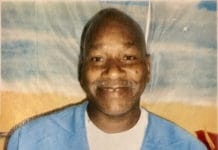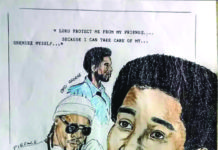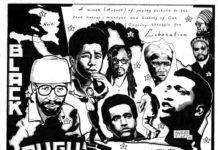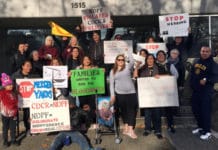Don’t miss the highly acclaimed play, ‘Solitary Man: My Visit to Pelican Bay State Prison,’ performed by Charlie Hinton and Fred Johnson:
- Saturday, Feb. 10, 7:30 p.m., at ANSWER, 2969 Mission St., San Francisco
- Wednesday, Feb. 14, 7 p.m., at Freedom Archives, 518 Valencia, San Francisco – Show the Bay View some love on Valentine’s Day!

What is “Solitary Man” about? Why was it written? What does it aim to accomplish?
From 2011-2013, inmates in the Security Housing Units – a thinly veiled euphemism for solitary confinement – of Pelican Bay State Prison in California went on a series of hunger strikes. The largest of these strikes began on July 8, 2013, when more than 30,000 inmates throughout state prisons in California refused food.
Concurrent with the hunger strikes, in May 2012, the Center for Constitutional Rights filed Ashker v. Governor of California, a federal class action lawsuit on behalf of inmates who had spent more than a decade in solitary confinement. The landmark settlement agreement that was reached in Ashker dramatically reduced the solitary confinement population, ended the practice of placing inmates who had not violated any prison rules in isolation and put a limit on the length of time a prisoner could spend in solitary confinement.
The Ashker case could not have existed without the brave men and women who put their own safety and health at risk by staging the largest hunger strike in the state of California, possibly the largest in the world. We must not forget their sacrifices – or their stories. And one advocate, Charlie Hinton, is committed to making sure that the legacy of that historic hunger strike is not forgotten.
Charlie is no stranger to the world of social justice movements and advocacy work. Having spent three years in the Peace Corps in Bolivia, Charlie became involved in LGBT liberation and prison work upon returning home.
The Ashker case could not have existed without the brave men and women who put their own safety and health at risk by staging the largest hunger strike in the state of California, possibly the largest in the world. We must not forget their sacrifices – or their stories.
A seminal event that drew Charlie irrevocably towards prison work was the trial of the San Quentin Six – six inmates at San Quentin State Prison who were accused of participating in an Aug. 21, 1971, escape attempt that left six people dead. Charlie attended the trial and remembers seeing the defendants being led into the courtroom in chains, recalling vividly how the chains “seemed so unnecessary, like they were meant just to scare the jury and the public. It changed me forever.”
Throughout the years, Charlie continued his commitment to working with prisoners and, during the July 2013 hunger strike, he responded to an action alert to write letters of support to the strikers. Several of the inmates wrote him back and it was through these responses, as well as Charlie’s conversations with former prisoners and his own personal observations, that “Solitary Man” was born.
“Solitary Man” began as a solo performance. It focuses on Charlie’s interactions with one particular inmate, Otis Washington, a 64-year-old man who has been incarcerated for over 40 years. Otis had participated in all the hunger strikes at Pelican Bay since 2011 and had been a source of powerful inspiration for other inmates. In “Solitary Man,” Otis delves into what he has learned and experienced through his years in solitary confinement.
“Solitary Man” began as a solo performance. It focuses on Charlie’s interactions with one particular inmate, Otis Washington, a 64-year-old man who has been incarcerated for over 40 years.
Partnering with Fred Johnson, a jazz trumpeter, the solo show has transformed into a two-person play, with Fred now playing the role of Otis, as well as providing music for the production. Fred is a formerly incarcerated person who has gone on to address the human rights issues of drug users and formerly incarcerated persons, as well as the wider community, guided by harm reduction principles. He has worked in policy analysis and syringe access programs throughout the U.S. He plays trumpet, mostly in the New York City area and has recorded a CD, “History Speaking: A Tribute to My Mentors.”
Partnering with Fred Johnson, a jazz trumpeter, the solo show has transformed into a two-person play, with Fred now playing the role of Otis, as well as providing music for the production.
The script marries Otis’s vivid firsthand narratives with stirring musical accompaniments to create a powerful experience for the audience. The very personal nature of “Solitary Man” will hopefully have a humanizing effect on the discussions around prison reform, which often focus more on policy than on the very real, personal impact incarceration has on prisoners and their family members. “The world is such a cold and cruel place these days,” Charlie says, “I want ‘Solitary Man’ to add at least one drop of humanity.”
“The world is such a cold and cruel place these days,” Charlie says, “I want ‘Solitary Man’ to add at least one drop of humanity.”
The responses to “Solitary Man” reflect this goal:
“I/WE want to thank Mr. Charles Hinton for the wonderful work he is doing on our behalf – on behalf of all the prisoners in California. We need for the world to see a glimpse of our daily suffering through this play, ‘Solitary Man’!” – Brutha Sitawa, Pelican Bay hunger striker, signatory to the Agreement to End Hostilities, 2012
“I/WE applaud Charlie Hinton for using his time, talent and creativity to help our tortured class get the true story of our ordeal out to the world. A solidarity power salute to you, Charlie, for your ‘Solitary Man’ play.” – Brutha Baridi, Pelican Bay hunger striker, signatory to the Agreement to End Hostilities, 2012
“I’m a mother of a son who’s been in the prison system now 10 years. To hear Charlie put a voice to my silent pain lifted me. It gave me hope and strength that I need to finish this journey with my son.” – Denise Jones
“You should definitely not miss this show. Very important, very appropriate, right on time.” – Kiilu Nyasha
Other audience members have no experience with solitary confinement or the prison system but find “Solitary Man” to tell a riveting and important story about the criminal justice system in America and our responsibility to humanize it.
“Solitary Man” has two acts performed without intermission, which collectively run approximately one hour, with music. Charlie has performed the solo version of “Solitary Man” throughout the Bay Area and in New York City and Ithaca, N.Y. Fred and Charlie launched the new two-person version in September 2017 and return now, on Feb. 10 and 14, for two performances as benefits for the SF Bay View newspaper. For more information, please contact solitaryman@lmi.net.

 Store
Store












